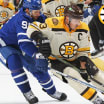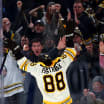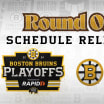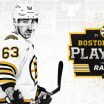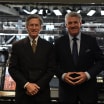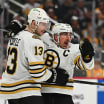BostonBruins.com - Bobby Orr is one of - if not the - greatest hockey players to ever step onto a sheet of ice.
Fittingly, he scored one of - if not the- most iconic goals in the history of the sport.
That Stanley Cup-clinching marker in 1970 resulted in one of - if not the- greatest sports photos of all time.
The image of Orr, then just 22, fully extended in mid-air - captured so perfectly by the late Ray Lussier of the Record American - hangs prominently in bars, basements, and bedrooms throughout New England.
Despite 50 Years of Accolades and Admiration, Orr's Modesty Still Reigns
Bruins legend remains humble even after piling up lengthy list of accomplishments, accolades
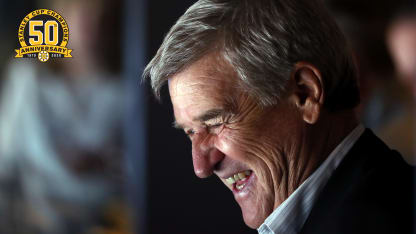
It is also cast in bronze, an 800-pound statue of that timeless moment - designed by Harry Weber - having welcomed fans and visitors in the shadow of TD Garden for nearly a decade.
What many may not realize about that statue is that the names of every single one of Orr's 1970 Bruins teammates are etched onto its base.
"Well first of all, we were a team. They should be on it. You don't win any championship by yourself," Orr said from his home in Florida on Wednesday during a conference call marking the 50th Anniversary of 'The Goal' and that 1970 Stanley Cup championship. "I was part of the puzzle, as the rest of the players were. I thought it was important that all of their names be on it."
That, perhaps, says more about Orr than any of those "greatest" accolades listed above or his countless other accomplishments and records - three straight MVPs, eight consecutive Norris Trophies, two Cup titles. The list goes on…and on.
In fact, it may be that legendary level of selflessness that defines No. 4.
When speaking about Orr - now and always, really - his teammates, friends, and acquaintances make sure to mention that as brilliant as the Hall of Famer was on the ice, he was just as special off of it.
"Bobby Orr had a Cinderella year," said Derek Sanderson, who delivered the feed to Orr on that famed goal. "Not that it was a fluke, but he did everything right, took it to another planet. For him to get that goal, Bobby, I was so happy. He did everything for everybody and it came to him."
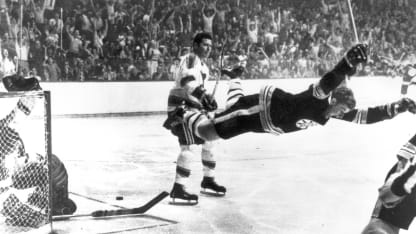
Like any aspiring hockey player, Orr - an ardent fan of the Toronto Maple Leafs as a child growing up in Parry Sound, Ontario - dreamed of one day making it to the NHL. While his skills continued to develop and his services became coveted when he was a teenager, visions of individual greatness were far from his mind. Thoughts of being an All-Star, a Hall of Famer - not to mention the best of all-time - never serviced.
Orr instead had a very specific image that played over and over again in his dreams.
"I can assure you that growing up, I did not think I would have a statue in front of Boston Garden," said Orr, who turned 72 in March. "I did dream about being on a Stanley Cup team and skating around Boston Garden, following Chief [John Bucyk] around with the Cup high overhead. I'm honored…never thought it would happen."
It happened on May 10, 1970, that brutally hot Mother's Day afternoon when his whack of Sanderson's pass zipped by St. Louis goalie Glenn Hall and clinched a four-game sweep of the Blues and Boston's first Stanley Cup since 1941. To this day, when Orr sees the famous photo of his tally, he thinks about Hall, whose own Hall of Fame career is often associated with 'The Goal.'
"Glenn Hall played [502] consecutive games, Stanley Cups, one of the great, great, great goaltenders," said Orr. "Poor Glenn, this is what they want to ask him about - a goal. It's terrible. Glenn was one of the greatest. Imagine, without a mask and playing [502] consecutive games in the NHL. And what do they want to talk about? Being the goalie. That's just wrong."
If that does not display the full scope of Orr's decency, nothing does.
So, where do those values come from? Orr, without hesitation, credited his parents, Arva and Doug, both of whom worked multiple jobs and instilled in him at a young age the importance of hard work and treating people right.
"I think that it all starts at home," said Orr. "My parents were hardworking people. They taught us the importance of being respectful and working hard and that's where it started. It just continued after I left home. My mother was a very special person. She had two jobs, my father had two and three jobs. They were always hardworking.
"My mother worked in a coffee shop and one day someone went in and said, 'How's your son doing?' And she said,' Which one? I have three.' That's how my mother was. She was very good to everyone…tried to treat everyone equally."
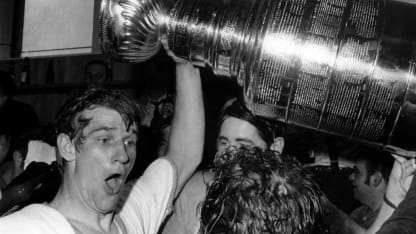
Orr also credited his elder teammates for building a strong culture around the Bruins, which was evident from the moment he became part of the Black & Gold in 1966. The blue liner has often told the story of how he was assigned to be Bucyk's roommate during his first training camp and upon his arrival, walked into the room to find Bucyk sitting on the bed in his underwear and smoking a cigar.
When Orr - a bit taken aback - said, 'Hello, Mr. Bucyk,' the Hall of Fame winger responded by saying he should only call him Chief or John.
"It was quite a thing, this young kid walking in and here I am," said Bucyk. "He automatically was being very polite…I said, 'Stop right there. It's John or it's Chief and that's it.' He said OK and that's where our friendship began."
It was that ideal, that each player on the roster was of equal importance, that helped the 1970 Bruins develop a unique bond that, no doubt, was a vital part of propelling them to a Stanley Cup title.
"Don't forget, until the World Hockey Association] came along, the players stayed together for a long time. Even the lines played together for long periods, years," said Orr. "We were part of the family and that's how people looked at it.
"We knew there was a responsibility to go out and perform the way we were supposed to perform and put smiles on faces. That was really what we tried to do. We were proud of the Bruins logo. We went out every night and gave 100 percent."
Orr noted that because of the team's special relationship with the fanbase they felt a level of obligation and accountability each time they stepped on the ice. It was a connection that was formed in part by how accessible the players were to the public - an aspect of the game that has dwindled in the age of technology and social media.
"We didn't hide away," Orr said when asked why the 1970s era Bruins resonated so much with the fans. "We were right there in the public and we had a lot of characters. We had a lot of fun, we played hard. Fans knew when they came to the game, they were gonna get an honest effort from everybody.
"That's what they expected and that's what they gave us. We had a wonderful following. We had a wonderful group of guys, great characters. I think that's got a lot to do with it.
"They weren't afraid of the players. They would be comfortable walking up to us and talking to us. That made the difference. And the game started to grow, rinks were starting to be built around. More kids were playing and more fans.
"We were just a fun group. We won a lot of hockey games and when you win you can have fun."
***[Bruins Foundation Raffle: Enter to Win Replica 'The Goal' Statue, Mother's Day Call from Orr*
The Big, Bad Bruins were as close to superheroes as any team in history, an idea that Orr couldn't help but scoff at on Wednesday morning given that the COVID-19 pandemic is wreaking havoc across the globe.
"We're celebrating a sporting event, that's great. But with everything that's going on, I think it's a good time to celebrate and thank all of the front-line workers, first responders, all the different organizations that are assisting our healthcare providers," said Orr.
"These people go to work every day making huge sacrifices, they're saving lives, comforting so many people. I played a game and they call us heroes? I don't think so.
"It's not a game to these healthcare workers, these front-liners, it's real life. I think we do owe them so much. We say thank you."
A noble message from a noble man.
"I just look at it like I was one of the lucky ones that got to play a great game, played with some wonderful people, met wonderful people throughout my career," said Orr. "I just feel like a lucky guy. I was playing a game, was being paid to play a game.
"That's a pretty good position to be in. I don't think a lot about being the greatest or anything like that. That really isn't my thing."

